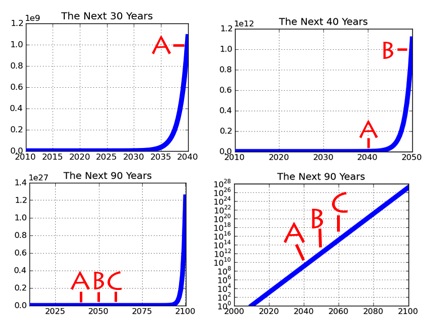Not all intelligences are capable of bootstrapping intelligence. We might call a mind capable of imaging another type of intelligence but incapable of replicating itself a Type 1 mind. A Type 2 mind would be an intelligence capable of replicating itself (making artificial minds) but incapable of making one substantially smarter. A Type 3 mind would be capable of creating an intelligence sufficiently smart that it could make another generation even smarter.This was interesting to think about for a moment, but when considered in light of what we understand about the creation of the only intelligent mind that we know of, the human mind, the divisions don't make any sense. The human mind was created through evolution. Evolution has no intelligence at all. Evolution works through random variation and selection. If evolution can create a mind without any intelligent design at all (indeed without any intention at all), why would an intelligent species actively working to replicate the feat have a problem doing so? Given enough time, the only capabilities an evolved mind would need in order to replicate its own intelligence would be (1) the ability to create random variations of a design and (2) the ability to evaluate whether the design was better or worse than the previous iteration. In other words, if an evolved intelligence is capable of undertaking the task of attempting to replicate itself, then, given enough time, it will probably succeed. The real question is how much time it will take. Given the successes in the world of AI research to date, humans appear to be moving quite a bit faster than evolution did.
The second point that I found interesting was that the date of the Singularity, the location of the "elbow" of the exponential curve, is completely arbitrary. He uses the following graphs to illustrate (borrowed from another blogger making the same point):
Of all Kelly's points that I've discussed on this blog, I think this is the most interesting. In some ways it actually fits well with my contention that the Singularity will not be post-scarcity. The abundance crowd, typified by Peter Diamandis, think that an explosion of material wealth, unlike anything we have ever experienced, will eliminate poverty and want, and lead to a age of abundance where resources are no longer scarce and human social relations are no longer largely defined by control over scarce resources. What he seems to be overlooking is that compared to a few hundred years ago, we are already living in a time of abundance, but poverty and want still exist, and human social relations are still very much defined by control over scarce resources. How can this be? The answer is that the human consumptive drive is determined not by some absolute measure of what is needed for survival but rather by what is available. The more there is, the more we want to consume. And we define our sense of well-being in terms of that relative measure which always grows to swallow whatever resources are available. Viewed in this light, the Singularity will not be a discrete moment that fundamentally changes the human condition, but rather will be a continuation of the processes that we have already been experiencing for hundreds of years.
So I think Kelly's point is a good one, but I also think he is overlooking something very important. The dates that thinkers like Kurzweil have picked out for the Singularity may really be their forecasts for when certain facts that have always typified human existence will change forever:
- work: when artificial intelligence is capable of doing all the things that humans can do, it will be more cost effective to have robots doing all of society's work, and work will no longer define the human experience of life.
- body: human bodies universally follow a design laid out by evolution; however, when we can re-engineer our bodies to have bigger brains, extra arms, nanobot immune systems, or to eliminate biological components altogether, the human body will no longer define person-hood.
- death: possibly the most important of these changes, there is nothing in the laws of physics that requires death (on human time scales anyway), and most likely we will eventually find ways to avoid it indefinitely.
Exponential technological progress may be properly viewed as a continuous phenomenon rather than a discrete one. But there are discrete points along the way that will have tremendous emotional and spiritual significance for everyone. Singularitans theorize that the elimination of work, body and death will happen in a compressed time frame. The Singularity was originally conceived as the point beyond which we cannot fathom. But the future is always hard to predict, and perhaps Kelly is right that we experience change as continuous rather than discrete. Perhaps what people really mean by the Singularity is the point where technology has changed key elements that have defined what it means to be human for as long as humans have existed.
